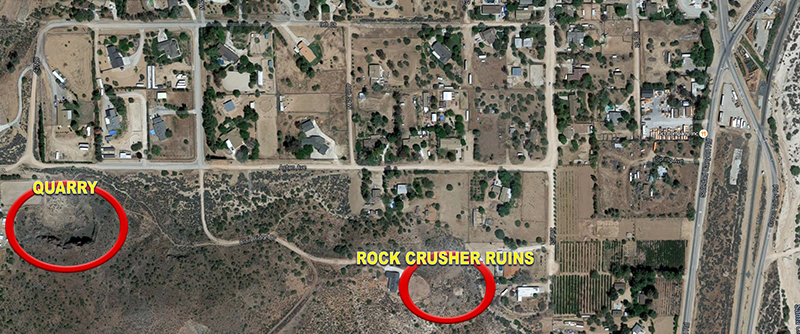|
|
Acton Rock Co. Fails to Win County Road Contract.
Los Angeles Herald | April 19, 1910.
|
Offers County 100,000 Tons Rock at 70 Cents. Riverside Cement co. Has Little Competition in Bid. Los Angeles Herald | Tuesday, April 19, 1910. Los Angeles county was offered 100,000 tons of crushed rock for the highway project for 70 cents a ton on board of cars at Riverside by the Riverside Portland Cement company yesterday afternoon. The board of supervisors has already contracted to buy 76,000 tons from the same company at the same price. The Acton Rock company was the only other bidder, asking 90 cents for a ton on board cars at Acton on the Southern Pacific in the northern part of the county. The bids were referred to the highway commission. The rock is being bought by the highway commission because of the inability of the county quarry at San Dimas to supply rock for some time. C.W. Brashear placed the lowest big for about eight miles of highway work which will call for the use of about 30,000 tons of rock. His figures were $3,379.20 for one section. $12,869.45 for the other section and for grading and culverts and the laying of rock for pavement $1.69 a ton. The bids were referred to the highway commission. News story courtesy of Bob Buechner. About the Acton Rock Crusher.
Southwest of the junction of Soledad Canyon Canyon Road and Crown Valley Road are the ruins of the Acton Rock Crusher, a short-lived enterprise at the foot of Parker Mountain that sought not to separate gold from quartz, but rather to crush rock for use in concrete and railroad track ballast. In 1909, some entrepreneurs purchased land from J.H. Walker south of the Acton School and spent much of 1910 hiring workers and building the crusher. They had a rough go of it; their bid to supply a large amount of concrete for county roads at 90 cents a ton lost out in April 1910 to an established Riverside competitor at 70 cents. In 1911 the outfit nonetheless started mining rock from a quarry just west of the crusher and hauled it to market via a spur line to the Southern Pacific Acton depot. It was soon determined, however, that the rock was of an inferior grade, and the whole operation was abandoned in 1912, only a year after it had started. A hundred years later, its most prominent feature, a vertical concrete slab on the hillside, still can be seen from the road. Meryl Adams (1988:197-198) tells the story: The greatest show of blacksmith activity in the town of Acton came in September 1910 when the Acton Rock Crusher project was beginning to get under way. The Acton Rock Company Blacksmith Shop set up operations in the old Nickel barn on the corner of Cory and Fourth Street. [Quoting the Acton Rooster newspaper]: "They have a complete blacksmith outfit, the merry clank of metal is heard all day long nowadays in Acton, as their smithy plies his trade. They are ready for all kinds of work." Just around the corner on Second Street, Walter Duehren, Acton's blacksmith, joins in the "Merry Anvil Chorus." During the year 1910 there was every indication that this Acton Rock Crusher outfit was systematic and thorough in planning and working to get the building of this well-engineered operation under way. The railroad was putting in the siding tracks needed; the Edison Company was running their poles from Saugus to Acton, by way of Mint Canyon to avoid winter washout problems which might occur if the Soledad Canyon route was used. By September 1910 the old Kruger Saloon building was rented to the Rock Company for use as sleeping quarters for the men who would be working in the rock quarry. The company received 60 iron cots with spring coils for this purpose. The old saloon building was no longer needed for its original purpose; the town had voted dry and if it ever voted differently, there was always the bar in the Hotel Acton. For 21 years the old saloon had served Acton. In August of 1910 Ira L. Hauser sold his general store to the Rock Company and moved to Los Angeles. R.E. Nickel leased his home and lots on the corner of Cory and Fourth to the Rock Company. Mrs. Threlkeld, hired by the Rock Company, was running the Hotel Acton. In fact, it began to look as if the Rock Company owned the whole town. All electric equipment was in place, the trolleys were running, the whistles were blowing and by May 1911, operations were begun. By June 1911, after shipping 58 carloads of crushed rock in May it was determined that the quality was not as good as expected; therefore a new quarry was explored. Near the end of 1911, the company moved the electric shovel to their other plant in Pacoima, which was the beginning of the end of the Acton Rock Crusher. May 1912 and Mr. Haisch found himself with a lease of the Acton Rock Crosher. The Rock Company kept the store for awhile. Mr. and Mrs. Haisch took the store over by the 1920s and Mr. Haisch became postmaster in 1922.
|
The site owner makes no assertions as to ownership of any original copyrights to digitized images. However, these images are intended for Personal or Research use only. Any other kind of use, including but not limited to commercial or scholarly publication in any medium or format, public exhibition, or use online or in a web site, may be subject to additional restrictions including but not limited to the copyrights held by parties other than the site owner. USERS ARE SOLELY RESPONSIBLE for determining the existence of such rights and for obtaining any permissions and/or paying associated fees necessary for the proposed use.



